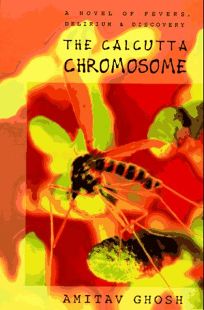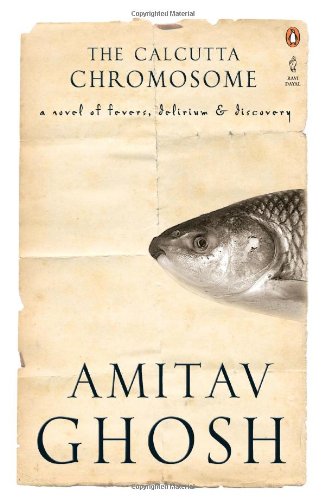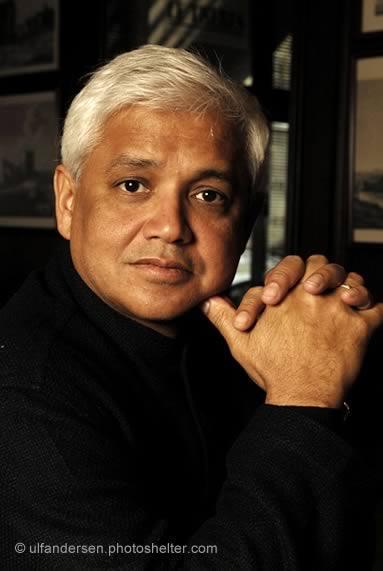The Calcutta Chromosome is one of the epoch making novels written by Amitav Ghosh. This book is an amazing mystery and it is solved only if you read between the lines. I got this book from my college library and it actually took me 12 days to finish this book as I kept it for my college free lecture reading. I was enthralled by the way Amitav portrayed his characters. This novel was an interesting read. Lets go deeply in it:


Cover- Since it was an old copy so I would describe about the old cover. It is creamish white in colour and has a picture of a fish. It looks simple yet intriguing.
Title- The title of the book gives us a glimpse that the story is about a particular city Calcutta(now known as Kolkata).
Regional Novel- This novel is a contrast of regions but the main focus is on Calcutta. The other locations are also mentioned and explained. All the role plays are played around the locations.
Sci fiction- This book comes under Science Fiction as well. The theories used to find about the malaria. The experiments and other clues also. The mention of word chromosome is in itself a part of science, biology to be specific. But looking at the other side, this novel fails as a science fiction. A normal reader might get bored while reading those science facts whereas A science person may also get upset as there is not much explained. The lack of details can be considered as a drawback.
Plot- The Calcutta Chromosome begins in the near-future, in New York, where Antar works for the mega-organization the International Water Council. The IWC had swallowed up Antar’s previous employer, an NGO called LifeWatch (“that served as a global public health consultancy and epidemiological data bank”). Now he works from home, linked up by computer, doing drudge work.
Ghosh offers a mild dystopia here. Antar’s New York is a more desolate, decrepit, and impersonal one than the present-day city, but Antar can still find convivial souls and his life isn’t all too bad. Ghosh doesn’t expend much energy on working out a vision of the future, and didn’t put too much thought into it. Antar’s computer, known as Ava, is a pretty neat thing, able to speak in any dialect and do a good number of things, but otherwise Ghosh’s future sounds out of date even these few years after he wrote it. His Internet is still expensive and slow, for example. And Antar’s friends discuss “some new scam for saving on subway tokens” — when it must have been clear even in 1995 (when the book was first published) that the subway token would soon be phased out, replaced by a more flexible electronic card system. (Tokens are still in use in New York, but for years the preferred system has been the so-called MetroCard.)
Ghosh’s quaint lack of imagination about the future is only appropriate, because the focus of the book is on the past. The past first drops into Antar’s lap — or rather: appears on his computer screen — in the form of a piece of an ID card from another LifeWatch employee, L.Murugan. Murugan went missing in 1995 in Calcutta and, as it happens, Antar met him before then.
Murugan was obsessed with Ronald Ross, who had received the Nobel Prize in 1902 for his work on malaria. With that the three timelines are set, and the novel shifts back and forth between them: there is Antar’s present, as he investigates the ID card and what might have happened. There are the events leading up to Murugan’s disappearance in 1995, which include his discussions with Antar and then his adventures in Calcutta. And there are the events from the late 19th century, as the malaria-discoveries are being made (these events are largely — and confusingly — related by Murugan, though often based on accounts and letters from that time).
It is complicated — and it gets more so. There are different casts of characters: few in New York, more in Calcutta, and a whole slew in 19th century India.
Ross’ malaria-related discoveries are the key. It turns out the discoveries are surprising, as is how he came to make them. And Murugan thinks there is more to them too — the Calcutta chromosome, for one. The steps of Ross’ discovery were also remarkably fortuitous: they almost seem to fall into place for him, and this is where Murugan focusses his attention.
Murugan wants to follow Ross’ trail — and that of some of the mysterious figures around him. That, of course, snarls him in complications as well. And Antar, following Murugan’s trail … well, it’s pretty clear where that is going to lead.
The malarial theories and what Ghosh does with them aren’t bad. Ghosh has some clever ideas, and the stories meander along quite entertainingly for the most part. There are other figures in Calcutta — a journalist, a writer, and others — who play larger roles, and some of the story comes together quite nicely. Unfortunately, however, Ghosh eventually settles for hokey mysticism rather than anything more soundly scientific, and the book tapers off to its predictable but unsatisfying conflation.The back and forth and mix of stories is just a bit much for Ghosh to handle. It becomes a narrative mess — unnecessarily so, too: it’s simply a case of bad craftsmanship, as these strands certainly could have been woven together more elegantly. Ghosh writes reasonably well, but not particularly so (at least in this novel): it is the stories that keep the reader interested.
Much of the novel, and many of the stories are entertaining, and for most of the way it is a quick, compelling read. But much of Ghosh’s dénouement — which one can see coming after a while — disappoints. The book does not live up to the promise it occasionally shows.Source: http://www.complete-review.com/reviews/ghosha/cchromo.htm
I would like to say Ghosh is a master of plot and the way he delineated this is impeccable.
Characterisation- The characters were well built and worked upon. The protagonists were apt whereas the minor characters also helped in the progression of the story.
Style- The author has used a third person narrative along with impersonal descriptions. Everything was explained in detail with lots of space given to the characters and the locations. But, the pace of the story was slow. It actually bored me in the start. I really loved the way the two stories moved in a parallel order. The sentences were well built. There was less of science element which may disturbs a science person.
Availability- http://www.amazon.com/exec/obidos/ASIN/0380813947/ref=nosim/completereview
http://www.amazon.co.uk/exec/obidos/ASIN/0380813947/ref=nosim/completereview07
http://www.amazon.ca/exec/obidos/ASIN/0676970230/ref=nosim/completerev0d-20
ABout the Author

Amitav Ghosh was born in Calcutta and grew up in India, Bangladesh and Sri Lanka. He studied in Delhi, Oxford and Alexandria and is the author of The Circle of Reason, The Shadow Lines, In An Antique Land, Dancing in Cambodia, The Calcutta Chromosome, The Glass Palace, The Hungry Tide, and the first two volumes of The Ibis Trilogy; Sea of Poppies, and River of Smoke.
The Circle of Reason was awarded France’s Prix Médicis in 1990, and The Shadow Lines won two prestigious Indian prizes the same year, the Sahitya Akademi Award and the Ananda Puraskar. The Calcutta Chromosome won the Arthur C. Clarke award for 1997 and The Glass Palace won the International e-Book Award at the Frankfurt book fair in 2001. In January 2005 The Hungry Tide was awarded the Crossword Book Prize, a major Indian award. His novel, Sea of Poppies (2008) was shortlisted for the Man Booker Prize, 2008 and was awarded the Crossword Book Prize and the India Plaza Golden Quill Award.
Amitav Ghosh’s work has been translated into more than twenty languages and he has served on the Jury of the Locarno Film Festival (Switzerland) and the Venice Film Festival (2001). Amitav Ghosh’s essays have been published in The New Yorker, The New Republic and The New York Times.His essays have been published by Penguin India (The Imam and the Indian) and Houghton Mifflin USA (Incendiary Circumstances). He has taught in many universities in India and the USA, including Delhi University, Columbia, Queens College and Harvard. In January 2007 he was awarded the Padma Shri, one of India’s highest honours, by the President of India. In 2010, Amitav Ghosh was awarded honorary doctorates by Queens College, New York, and the Sorbonne, Paris. Along with Margaret Atwood, he was also a joint winner of a Dan David Award for 2010. In 2011 he was awarded the International Grand Prix of the Blue Metropolis Festival in Montreal.